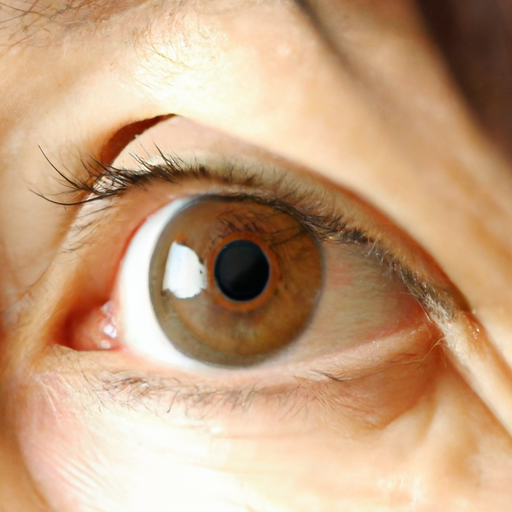Imagine if there was a way to give your eyes the support they need to maintain optimal vision. We all know that taking care of our eyes is crucial, but did you know that there are supplements available specifically designed for vision support? In this article, we will explore whether there are any supplements for vision support and how they may contribute to maintaining healthy eyesight. So, if you’re curious about finding natural ways to take care of your vision, keep reading to learn more about these potential supplements and their benefits.
Understanding Vision Loss and Degeneration
The anatomy of the eye and vision
Your eyes are incredibly complex organs that play a crucial role in your ability to see and interpret the world around you. The anatomy of the eye involves various structures that work together to capture light and convert it into electrical signals that can be interpreted by your brain. Key components of the eye include the cornea, iris, lens, retina, and optic nerve.
The cornea is the clear, dome-shaped structure that covers the front of your eye. It helps to focus light onto the retina, which is located at the back of the eye. The iris, which is the colored part of your eye, controls the size of the pupil, regulating the amount of light that enters the eye.
The lens, located behind the iris, further focuses light onto the retina. The retina contains specialized cells called rods and cones, which are responsible for converting light into electrical signals. These signals are then carried by the optic nerve to the brain, where they are interpreted as visual information.
Common causes of vision loss
Unfortunately, there are numerous conditions and factors that can lead to vision loss and degeneration. Some common causes include age-related macular degeneration (AMD), cataracts, glaucoma, and diabetic retinopathy.
AMD is a progressive disease that affects the macula, the central part of the retina responsible for sharp, central vision. Cataracts occur when the lens of the eye becomes cloudy, leading to blurred vision. Glaucoma is a group of eye conditions that damage the optic nerve, often due to increased pressure inside the eye. Diabetic retinopathy is a complication of diabetes that affects the blood vessels in the retina, leading to vision loss.
Preventing and managing vision loss
While some causes of vision loss may be beyond your control, there are steps you can take to help prevent and manage vision loss. Regular eye exams are essential for early detection and treatment of any potential issues. It is recommended to have your eyes examined by an optometrist or ophthalmologist at least once every one to two years.
Maintaining a healthy lifestyle can also support eye health. This includes eating a balanced diet, protecting your eyes from ultraviolet (UV) radiation with sunglasses, avoiding smoking, and practicing good hygiene by washing your hands before touching your eyes to minimize the risk of infection.
Additionally, it’s important to manage any underlying health conditions such as diabetes or high blood pressure that may contribute to vision loss. Follow your doctor’s recommendations for medication, lifestyle changes, and regular check-ups to reduce the impact of these conditions on your vision.
The Role of Nutrition in Eye Health
Dietary needs of the eyes
Proper nutrition is essential for maintaining good overall health, and your eyes are no exception. Adequate intake of specific nutrients is particularly important for supporting and protecting your eyesight. Some key nutrients that play a crucial role in eye health include vitamin A, vitamin C, vitamin E, omega-3 fatty acids, zinc, lutein, and zeaxanthin.
Impact of deficiencies on eye health
Deficiencies in these essential nutrients can have a negative impact on your eye health. For example, a lack of vitamin A can lead to night blindness or dry eyes. Vitamin C deficiency may increase the risk of cataracts and macular degeneration. Insufficient intake of omega-3 fatty acids has been associated with an increased risk of dry eye syndrome.
Furthermore, low levels of zinc in the body can impair night vision and lead to the development of cataracts. Lutein and zeaxanthin deficiencies have been linked to an increased risk of AMD and cataracts.
Balanced nutrition for optimum eye function
To support your eye health, include a variety of nutrient-rich foods in your diet. Dark leafy greens like spinach, kale, and collard greens are excellent sources of lutein and zeaxanthin. Carrots, sweet potatoes, and bell peppers are rich in beta-carotene, which is converted into vitamin A in the body.
Citrus fruits, berries, and kiwis provide ample vitamin C, while nuts, seeds, and oils are excellent sources of vitamin E. Cold-water fatty fish like salmon, mackerel, and sardines are rich in omega-3 fatty acids. Finally, opt for lean meats, legumes, and whole grains to ensure an adequate intake of zinc and other B vitamins crucial for eye health.

This image is property of images.unsplash.com.
Understanding Dietary Supplements
The concept of dietary supplements
Dietary supplements are products intended to supplement your daily diet and provide essential nutrients that may be lacking in your regular food intake. They come in various forms, including capsules, tablets, powders, and liquids. Supplements are regulated by government agencies to ensure their safety and efficacy.
Benefits of dietary supplements
Supplements can be beneficial in filling nutrient gaps and supporting overall health, including eye health. They provide a convenient way to meet recommended dietary allowances for specific nutrients, especially for individuals with specific dietary restrictions or limited food choices.
In the context of eye health, supplements can help ensure an adequate intake of key nutrients that support optimal visual function and protect against vision loss. They may play a role in preventing or managing certain eye conditions, particularly when combined with a balanced diet and overall healthy lifestyle.
Risks associated with dietary supplements
While dietary supplements can be beneficial, it’s essential to understand that they are not a replacement for a healthy diet. It’s always best to obtain nutrients from whole foods whenever possible, as they provide a wide range of beneficial compounds that work together synergistically.
Additionally, improper use or excessive intake of certain supplements can have adverse effects on your health. Some supplements may interact with medications you are taking or have contraindications for specific medical conditions. It is crucial to consult with a healthcare professional before adding any new supplement to your routine, especially if you have underlying health issues.
Common Supplements for Eye Health
Vitamin A and beta-carotene
Vitamin A is a crucial nutrient for maintaining good eye health. It plays a vital role in the production of rhodopsin, a pigment in the retina that helps with low-light and night vision. Foods rich in vitamin A include liver, fish, dairy products, and fortified cereals.
Beta-carotene, a precursor to vitamin A, is also important for eye health. It acts as an antioxidant and protects the retina from damage caused by oxidative stress. Foods high in beta-carotene include carrots, sweet potatoes, apricots, and spinach.
Vitamin C (ascorbic acid)
Vitamin C is an antioxidant known for its role in supporting the immune system, but it also plays a part in maintaining healthy eyes. It helps reduce the risk of cataracts and AMD by neutralizing harmful free radicals in the eye. Citrus fruits, strawberries, bell peppers, and broccoli are excellent sources of vitamin C.
Vitamin E
Vitamin E is another powerful antioxidant that can protect the eyes from oxidative damage. It helps maintain healthy blood vessels in the eyes and reduces the risk of developing cataracts and AMD. Good sources of vitamin E include nuts, seeds, vegetable oils, and spinach.
Omega-3 fatty acids
Omega-3 fatty acids are a type of polyunsaturated fat that has anti-inflammatory properties. They help support overall eye health, reduce dry eye symptoms, and lower the risk of AMD. Cold-water fatty fish like salmon, tuna, and mackerel are rich sources of omega-3 fatty acids.
Zinc
Zinc is a trace mineral that plays a crucial role in maintaining good eye health. It contributes to the function of many enzymes in the retina and helps protect against age-related macular degeneration. Oysters, beef, poultry, and beans are all excellent sources of zinc.
Lutein and zeaxanthin
Lutein and zeaxanthin are two carotenoids that accumulate in the macula of the eye, providing protection against harmful blue light and oxidative damage. They help maintain visual function and reduce the risk of AMD and cataracts. Foods rich in lutein and zeaxanthin include leafy green vegetables, eggs, and corn.

This image is property of images.unsplash.com.
Member of B Vitamins Family and Vision Loss
Vitamin B1 (Thiamin)
Vitamin B1 is essential for maintaining a healthy nervous system, including the optic nerves responsible for transmitting visual signals to the brain. It also helps protect against certain eye conditions, such as cataracts and glaucoma. Whole grains, lean pork, and legumes are good sources of thiamin.
Vitamin B2 (Riboflavin)
Vitamin B2 plays a crucial role in maintaining good vision and eye health. Deficiency in riboflavin can lead to dry, itchy eyes and sensitivity to light. Good dietary sources of riboflavin include milk, dairy products, lean meats, and leafy green vegetables.
Vitamin B3 (Niacin)
Niacin is important for maintaining healthy blood vessels in the eyes and improving circulation. It helps reduce the risk of developing cataracts and AMD. Fish, poultry, peanuts, and legumes are all good sources of niacin.
Vitamin B6
Vitamin B6 supports the production of neurotransmitters that transmit information from the eyes to the brain. It also aids in the formation of red blood cells, which are important for maintaining optimal eye health. Good sources of vitamin B6 include poultry, fish, bananas, and chickpeas.
Vitamin B12
Vitamin B12 is essential for maintaining the health of the optic nerve and preventing damage to the nerve cells. It plays a crucial role in the production of red blood cells, which are responsible for delivering oxygen to the eyes. Vitamin B12 is found naturally in animal products such as meat, fish, eggs, and dairy.
The Scientific Evidence Behind Vision Supplements
Existing research on vision supplements
Numerous studies have investigated the potential benefits of various supplements for eye health. Some studies suggest that certain nutrients, such as vitamin C, vitamin E, omega-3 fatty acids, and lutein/zeaxanthin, may help reduce the risk of certain eye conditions or slow down their progression. However, additional research is needed to establish clear guidelines and recommendations.
Interpreting the study results
It is important to approach the scientific evidence with a critical eye and consider the limitations of each study. Some studies may have small sample sizes or short durations, making it difficult to draw definitive conclusions. Furthermore, individual responses to supplements may vary based on factors such as age, overall health, and genetic predispositions.
Limitations and considerations for research on vision supplements
Further research is needed to establish the optimal dosage, duration, and combination of supplements for various eye conditions. Long-term studies are necessary to determine the sustained benefits and potential risks of supplement use. Additionally, it’s important to consider that supplements should not replace traditional treatments or neglect other aspects of eye health, such as regular eye exams and a healthy lifestyle.

This image is property of images.unsplash.com.
Choosing a Vision Supplement
Understanding supplement labels
When choosing a vision supplement, it’s important to carefully read and understand the product labels. Look for supplements that clearly list the ingredients, the amounts per serving, and any other active components. Check for the presence of third-party certifications or quality seals, indicating that the product has been tested for purity, potency, and quality.
Quality assurance in supplements
To ensure the quality of a vision supplement, look for products manufactured by reputable companies that adhere to strict manufacturing practices and standards. Consider the reputation and track record of the manufacturer, as well as any customer reviews or testimonials. It may also be helpful to consult with a healthcare professional for recommendations on trusted brands.
Choosing the right supplement for your needs
The choice of a vision supplement will depend on various factors, including your individual needs, specific health concerns, and any underlying medical conditions. It is important to consult with a healthcare professional, such as an optometrist, ophthalmologist, or primary care physician, before starting any new supplement regimen. They can provide personalized recommendations based on your unique circumstances.
Possible Side Effects and Interactions of Eye Supplements
Potential side effects
While most eye supplements are generally safe, it’s important to be aware of potential side effects that some individuals may experience. For example, high doses of certain vitamins or minerals, such as vitamin E or zinc, can cause stomach upset, diarrhea, or other digestive issues.
Additionally, some individuals may be allergic or sensitive to certain supplements or their ingredients. If you experience any adverse reactions, discontinue use and consult with a healthcare professional.
Interactions with medications
Some supplements may interact with certain medications, either reducing their effectiveness or increasing the risk of side effects. For example, omega-3 fatty acids can affect blood clotting and may interact with anticoagulant medications. It is crucial to inform your healthcare provider about all the medications, including supplements, that you are taking to prevent potential interactions.
Contraindications of use
Certain supplements may have specific contraindications or precautions for use, particularly for individuals with underlying medical conditions. For example, individuals with bleeding disorders should exercise caution when taking supplements that affect blood clotting. Pregnant or breastfeeding women should consult with a healthcare professional before starting any new supplement regimen, as some nutrients may have specific recommendations or limitations during these periods.

Consulting Healthcare Professionals
The importance of regular eye check-ups
Regular eye check-ups are essential for maintaining good eye health and detecting any potential issues early on. An optometrist or ophthalmologist can perform comprehensive eye exams to assess your vision, screen for eye diseases, and provide appropriate recommendations for your specific needs.
It is generally recommended to have your eyes examined at least once every one to two years, or as frequently as your healthcare provider advises. These exams can help ensure early detection and proper management of any vision or eye-related conditions.
When to consult a doctor before taking supplements
It is always important to consult with a healthcare professional before adding any new supplements to your routine, particularly if you have underlying health conditions or are taking medications. They can help determine if a particular supplement is appropriate for you, consider any potential interactions or contraindications, and offer personalized recommendations based on your individual needs.
Role of a nutritionist/dietitian in guiding supplement intake
If you have specific dietary restrictions, concerns, or goals related to eye health, consulting with a nutritionist or dietitian may also be beneficial. These professionals can provide guidance on optimizing your diet, identifying potential nutrient deficiencies, and determining if supplementation is necessary or appropriate based on your unique circumstances.
Conclusion: Are Vision Supplements Right for You?
Balancing prospective gains with potential risks
The use of vision supplements should be balanced by considering the potential gains in supporting eye health and managing certain conditions with the potential risks associated with supplement use. While supplements can play a role in filling nutrient gaps and supporting overall eye health, they should not be considered a cure-all or a substitute for a healthy lifestyle.
Personal and familial health history considerations
Individuals with a personal or familial history of specific eye conditions, such as AMD or cataracts, may have a higher risk and may benefit from targeted supplementation. It is crucial to discuss your personal and familial health history with a healthcare professional to determine if supplements are appropriate for your specific needs.
Importance of a comprehensive approach to eye health
When it comes to promoting and maintaining good eye health, it’s important to take a comprehensive approach. This includes regular eye check-ups, practicing good eye hygiene, protecting your eyes from harmful UV radiation, eating a balanced diet rich in eye-healthy nutrients, and considering the appropriate use of supplements when necessary.
By understanding the role of nutrition in eye health, being aware of the potential benefits and risks of vision supplements, and consulting with healthcare professionals, you can make informed decisions to support your vision and overall well-being. Remember, your eyes are precious, and taking proactive steps to care for them can contribute to a lifetime of clear, healthy vision.




